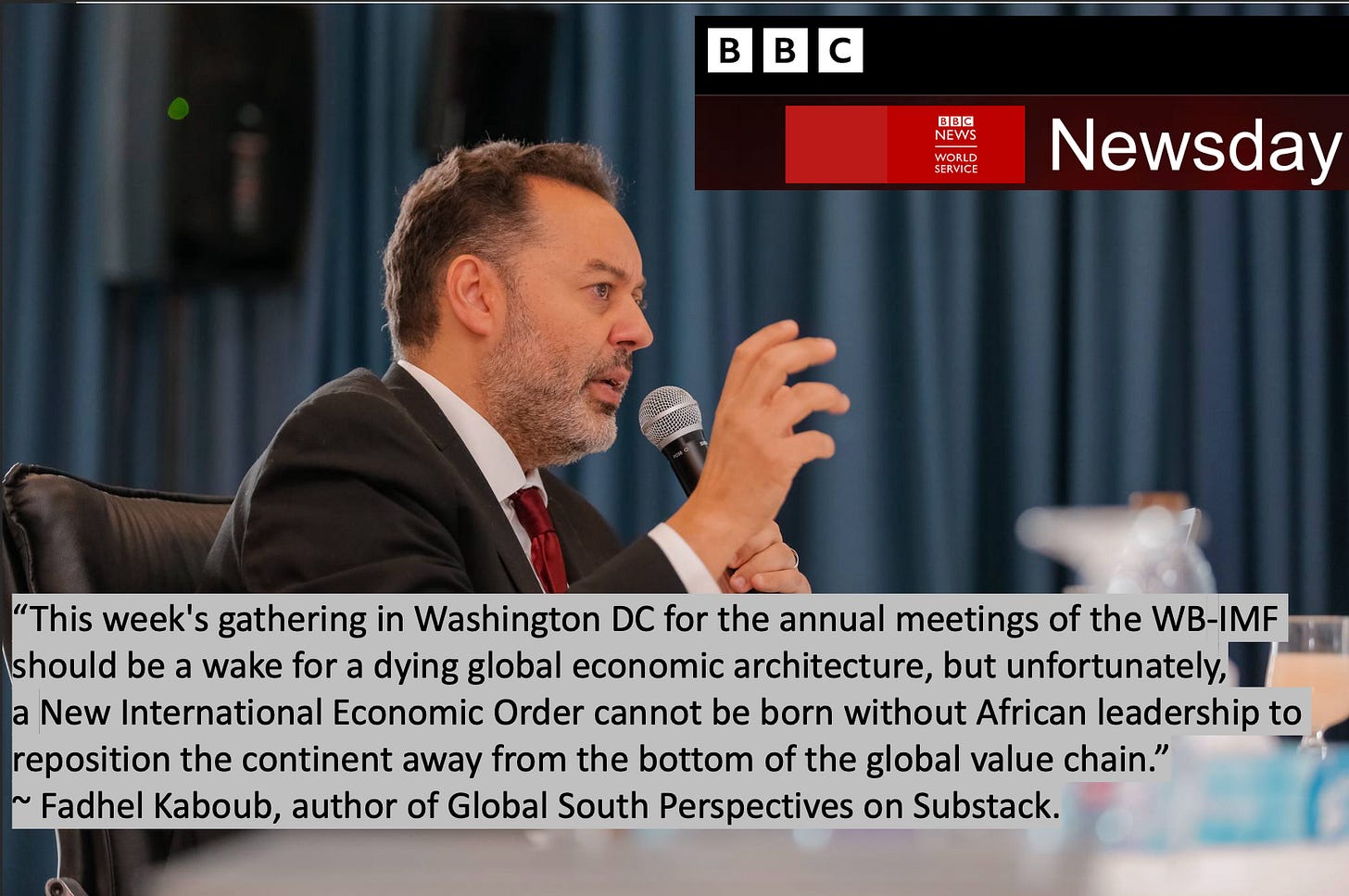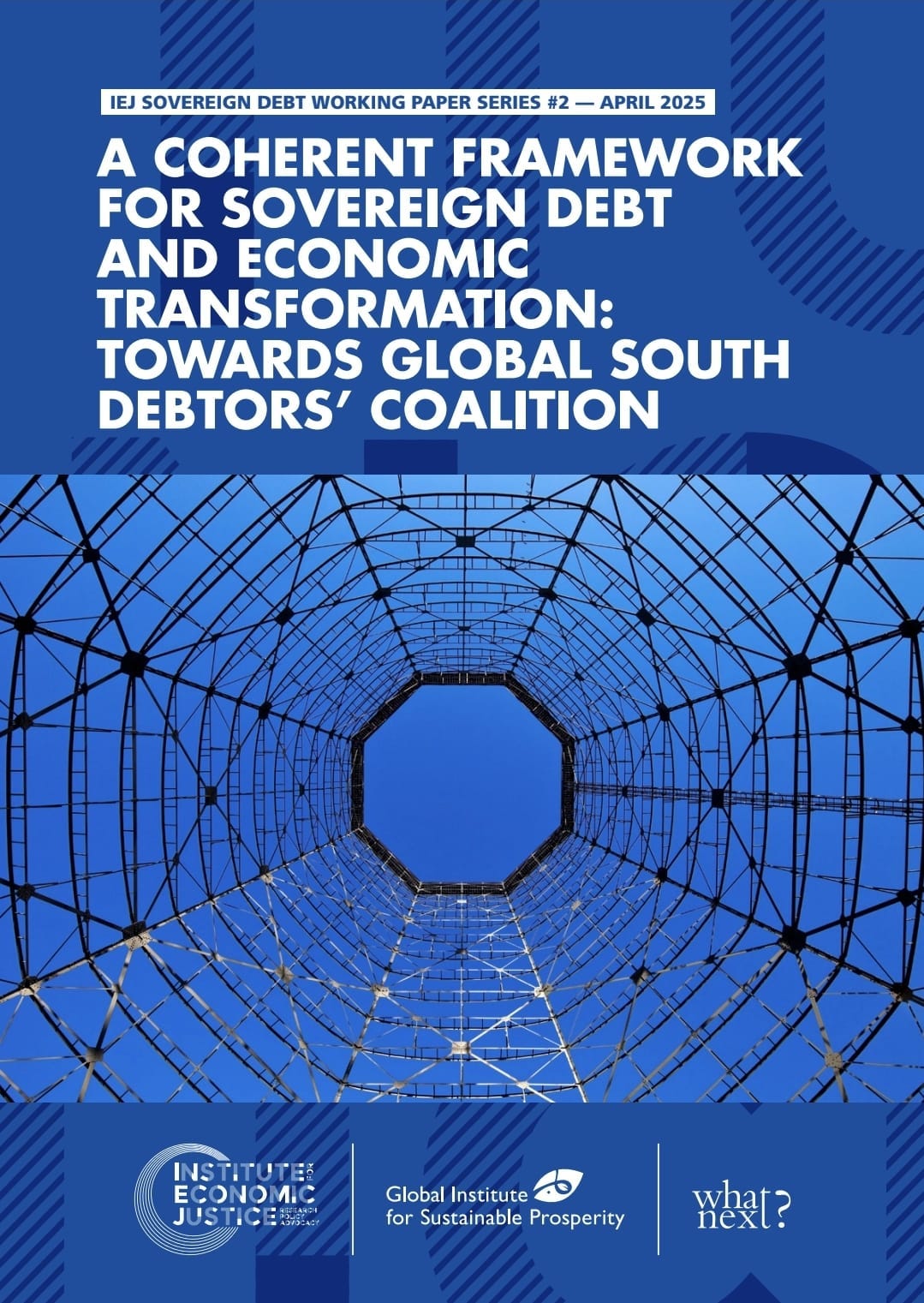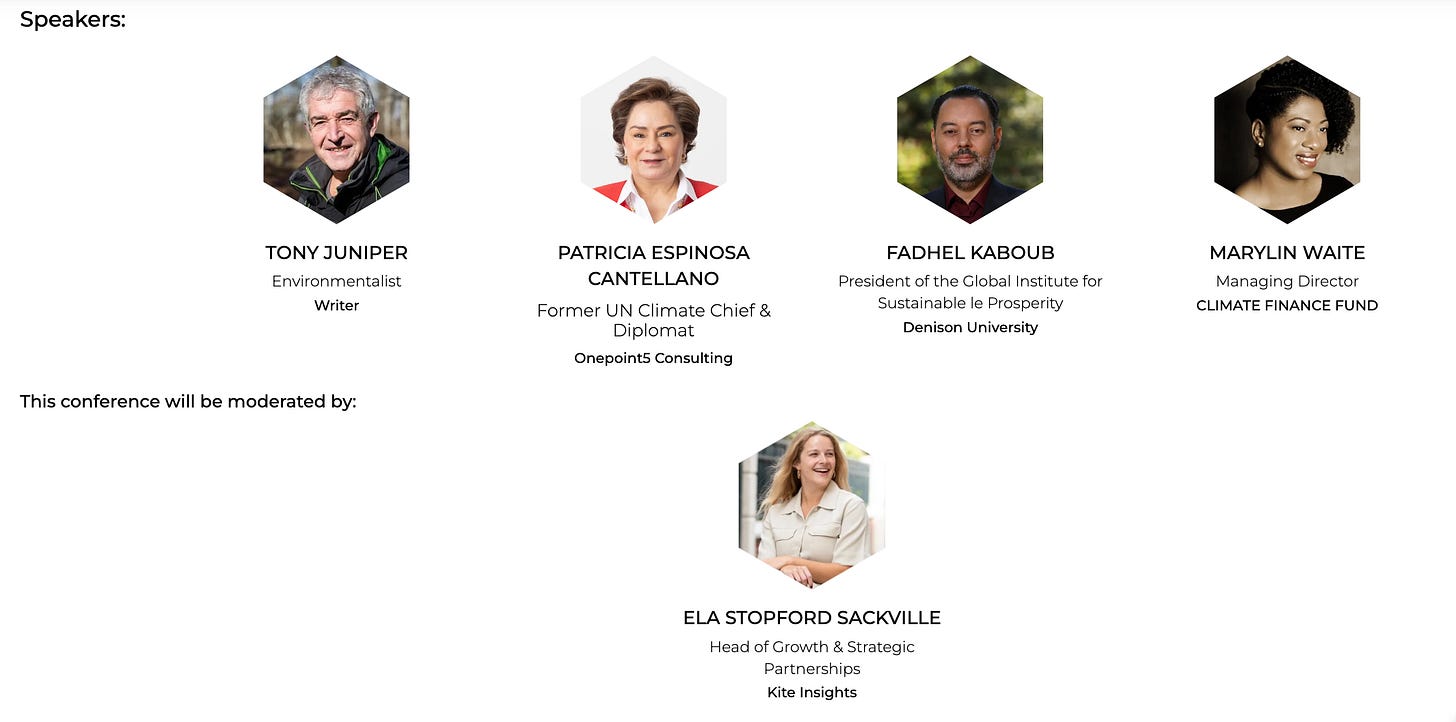Greetings from Tunis!
This week's gathering in Washington DC for the annual meetings of the World Bank and the IMF should be a wake for a dying global economic architecture, but unfortunately, a New International Economic Order cannot be born without African leadership to reposition the continent and the rest of the Global South away from the bottom of the global value chain. This is what I told the BBC Newsday on Monday. Click the image below to listen to the full interview.
Global South Debtors’ Coalition
I am very excited to share this co-authored paper with my colleague Andrés Chiriboga, which we published with the Institute For Economic Justice (IEJ) in South Africa. "A Coherent Framework for Sovereign Debt and Economic Transformation: Towards a Global South Debtors’ Club"
Abstract: Sovereign debt crises in the Global South are not isolated economic mishaps — they are structural features of a global economic system rooted in colonial legacies and sustained through dependency. This working paper from the Institute for Economic Justice (IEJ) challenges the narrative that current debt restructuring mechanisms, like the G20’s Common Framework or the Debt Service Suspension Initiative, can solve the crisis. These initiatives fail to address the structural roots of indebtedness, treating it as a liquidity problem rather than a deeper issue of trade imbalances, resource extraction, and economic subordination.
Debt, the paper argues, is a tool of neocolonial control — used by creditor nations and international financial institutions to keep the Global South locked into roles of resource extraction and low-value production. From Haiti’s independence debt to the modern debt burdens across Africa, Latin America, and Southeast Asia, sovereign debt has maintained economic hierarchies established during colonialism.
The paper proposes the formation of a Global South Debtors’ Coalition — a transformative platform for coordinated negotiation and collective economic planning. Learning from past coordination efforts like the Cartagena Initiative, it outlines strategies for building effective and lasting debtor alliances.
Central to this framework are three interlinked priorities: food sovereignty, energy independence, and industrial policy. The paper calls for strategic regional investments that can break the cycle of dependency and unlock long-term development.
A bold proposal — the “Bargain of the Century” — suggests leveraging the Global South’s collective market size, natural resources, and labour force to demand fairer trade, technology transfers, and investment. With South Africa holding the G20 Presidency and the FfD4 approaching, there is a real opportunity to push for a new, just, and multipolar international economic order.
This paper is a call to action: for debt justice, economic sovereignty, and a transformation agenda rooted in equity and sustainability.
ChangeNow Summit in Paris
I am on my way to Paris to speak on three panels in the next three days and to engage with some of the 40,000 climate change thinkers and organizers who will be attending the summit ten years after the Paris Agreement was reached.
The first panel I’ll be on is called Negotiating the Future. Here is the description:
"Negotiating our Future" will highlight the transformative shifts that must take place in international negotiations and the Bretton Woods Institutions to meet 21st challenges. It will explore the urgent need to center science and evidence-based decision-making while adapting international negotiations such as the COP framework and the Beyond Bretton Woods institutions . As the global landscape continues to evolve rapidly, it is essential to embrace negotiation and institutional frameworks that uphold human and planetary values, and take into consideration holistic systemic solutions with a particular emphasis on equity, well being, justice, and sustainable development for all. To truly build a better future, we must not only rethink how we engage in these discussions, and structure negotiations, but also reflect on how best to design future proof multilateral institutions and negotiations that are more inclusive of diverse voices and take into consideration the needs of the worlds most vulnerable, indigenous communities and our future planetary stewards "the youth". It is time to drive reforms to reflect today's turbulent poly crisis world and current attempts by the Trump administration to dismantle multilateralism and the rule of law. This calls for a global reaffirmation of the need for robust and inclusive international frameworks that foster peace, prosperity, and planetary stability but also enables a deep re-think of what multilateralism means in today's world. This session will reaffirm the need for multilateralism whilst exploring future institutional and negotiating scenarios that offer a brighter and more resilient future.”
The Second panel is called “Financing a Just Transition”
“This conference will address the urgent need to transform the global financial system for a fair and effective response to the climate crisis. Experts will examine how economic policies can align with nature’s limits while acknowledging the historical responsibilities of high-emission countries. Discussions will focus on concrete measures such as alleviating global debt in the Global South, reducing financial dependency, reforming taxation, and implementing structural changes to decolonize financial mechanisms. The session will highlight how financial decision-making impacts ecosystems and communities, aiming to shape a more regenerative, equity-driven financial model that serves both people and the planet.”
And the final session is called “Youth Parliament for a Well-Being Economy”
“The Youth Parliament for a Well-Being Economy is a groundbreaking session at ChangeNOW, co-created with young leaders to redefine economic priorities for a just and regenerative future. In a dynamic, hemicycle-style debate, experts and youth representatives will present six bold proposals for a well-being economy, with the audience voting on the top three priorities to be delivered to the UN Youth Office—shaping a youth-driven roadmap for COP30!”
I’m super excited to have these conversations!
Fadhel Kaboub is an associate professor of economics at Denison University, and the president of the Global Institute for Sustainable Prosperity. He is the author of Global South Perspectives on substack. He is a member of the United Nations High-Level Advisory Board on Economic and Social Affairs at UN-DESA. He is also a member of the Independent Expert Group on Just Transition and Development, an expert group member with the Global Solidarity Levies Task Force, a member of the Earth4All 21st Century Transformational Economics Commission, a Steering Committee member with the Fossil Fuel Non-Proliferation Treaty Initiative, and a member of the Independent Expert Group on Just Transition Finance. He has recently served as Under-Secretary-General for Financing for Development at the Organisation of Southern Cooperation in Addis Ababa, Ethiopia. Dr. Kaboub is an expert on designing public policies to enhance monetary and economic sovereignty in the Global South, build resilience, and promote equitable and sustainable prosperity. His recent work focuses on Just Transition, Climate Finance, and transforming the global trade, finance, and investment architecture. His most recent co-authored publication is Just Transition: A Climate, Energy, and Development Vision for Africa (May 2023). He has held a number of research affiliations with the Levy Economics Institute (NY), the John F. Kennedy School of Government at Harvard University (MA), the Economic Research Forum (Cairo), Power Shift Africa (Nairobi), African Forum on Climate Change, Energy and Development (Abuja), and the Center for Strategic Studies on the Maghreb (Tunis). Dr. Kaboub is currently working on a book manuscript tentatively called The Geopolitical Bargain of the Century: Towards a New International Economic Order of Peace, Justice, and Sustainable Prosperity (forthcoming 2025). You can follow him on LinkedIn, X/Twitter, Bluesky, YouTube, and TikTok @FadhelKaboub.










